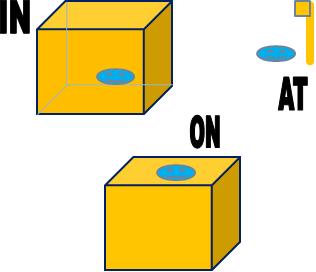 ‘ AT’ – ‘ON’ – ‘IN’
‘ AT’ – ‘ON’ – ‘IN’
All these prepositions are used with expressions of both, time and place. Click below for collocations
•→ Prepositions of TIME ⇐
Notice we tend to use ‘at‘ with clock times and special periods, ‘on‘ for a particular day, and ‘in‘ for longer periods.
If you focus on place, you must think in terms of a one-dimensional reference point (‘at‘), a two-dimensional area/line (‘on‘), or a three-dimensional volume/space (‘in‘)
♦ Animal Sentences with ‘On’ ⇓
The animals in the video include: chameleon, spider, turtle, alligator, butterfly, pelican, swan, vulture, cat, dog, buffalo, lynx, hummingbird, meerkat and stork.
◊ ‘FOR’ vs ‘TO’ ↓ →[quiz]←
•→ OVER← // •→ THROUGH←
¤ Prepositions showing Location, Time, Action & Movement←
¤→ Prepositions of Place & Direction … quizz ⇒ [02] ⇔ [03] ⇐
∇ Prepositions of movement . . . ⇒[01] ⇔ [02] ⇔ [03]⇐
¤ Adjective-Preposition Combinations ↓
•→QUIZ one←[ about/ at/ by/ for/ from] / •→QUIZ two←[of/ on/ to/ with]
¤ Collocations with nouns [For / In / By / On] …→QUIZ ←
•→Prepositions & Phrasal verbs ←•
◊ Collocations w/ «THINK» ⇓ …about, of, over, through, ahead, back, up, to
¤ End use of prepositions ¤
• Typical Use of Prepositions
Usually, the preposition (pre-position meaning «placing before») comes before its object in a phrase. Most often that object is a noun phrase or a pronoun. The preposition connects words together to show the relationship between words. Some examples of the regular use of the preposition in its usual place are as follows:
• Prepositions at the End
In some constructions, however, we place the prepositional object at or near the beginning of a clause. In the examples below, the preposition stays together with the verb, adjective, or noun with which it is associated:
Wh- questions:
Who’s the envelope for? What are you getting at? What’s the weather like?Wh- clauses:
These are people whom you would like to be associated with. I wish I knew what you were thinking of. Tell me what you’re worried about.Restrictive clauses introduced by ‘that’:
Here is the error [that] I told you about. Surely it’s the verdict that he’s so angry at. You remember the boy [ ] she was going out with?Infinitive structures:
Their last child was difficult to find a name for. Some people find suburbia a boring place to live in. The airport isn’t an easy place to get to.Passive voice verbs:
In some families, money is never spoken about. Yesterday, the plaintiff was operated on. We all hate being laughed at.By MARTHA FAULK [http://store.westlaw.com/pdf/perspec/wtip1299.pdf]





Deja un comentario